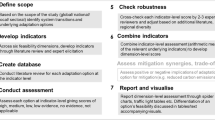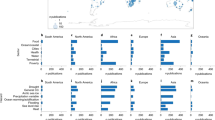Abstract
In early 2009, few would have expected that the Intergovernmental Panel on Climate Change (IPCC) would come under such massive attack. The IPCC had enjoyed a pristine reputation and had even advanced to become a role model for biodiversity and food security assessments (Loreau et al. 2006; Watson 2005). However, public trust and, with it, the organization’s credibility eroded dramatically after November 2009 with the events that became known as ‘climategate’. This article seeks to contribute to current debates about how to reform the IPCC. It argues that there are major flaws in the design of the IPCC which are rooted in the linear model of expertise and which are helping to stoke the backlash against the IPCC. The article analyzes the ways in which the IPCC’s activities conform to the linear model of expertise and considers the consequences of this for integrating adaptation into the IPCC assessments. It explains why adaptation played only a marginal role up until the IPCC Third Assessment Report. It then demonstrates why the use of the linear model of expertise constrains the scientific and political debate about adaptation and leads to proxy debates about scientific evidence, which result in depoliticizing the politics of adaptation and politicizing science. Finally, the article calls for the debate to be opened up to accommodate alternatives that are both politically more feasible and at the same time more appropriate to the specific needs of adaptation policies at different levels of decision-making.


Similar content being viewed by others
References
Adger WN, Agrawala S, Mirza MMQ, Conde C, O’Brien K, Pulhin J, Pulwarty R, Smit B, Takahashi K (2007) Assessment of adaptation practices, options, constraints and capacity. In: Parry ML, Canziani OF, Palutikof JP, van der Linden PJ, Hanson CE (eds) Climate Change 2007: Impacts, Adaptation and Vulnerability. Contribution of Workings Group II to the Fourth Assessment Report of the Intergovernmental Panel on Climate Change. Cambridge University Press, Cambridge, pp 717–743
Agrawala S (1998a) Structural and process history of the intergovernmental panel on climate change. Clim Chang 39(4):621–642
Agrawala S (1998b) Context and early origins of the intergovernmental panel on climate change. Clim Chang 39(4):605–620
Beck S (2004) Localizing global change in Germany. In: Jasanoff S, Martello ML (eds) Earthly politics. MIT Press, Cambridge, pp 173–194
Beck S (2009) Das Klimaexperiment und der IPCC. Schnittstellen zwischen Wissenschaft und Politik in den internationalen Beziehungen. Metropolis, Marburg
Bolin B (1994) Science and policy making. Ambio 23(1):25–29
Carter TR, Parry ML, Harasawa H, Nishioka S (1994) IPCC technical guidelines for assessing climate change impacts and adaptations. Department of Geography/University College London, London
Carter TR et al (2007) New assessment methods and the characterisation of future conditions. In: IPCC (2007), Climate Change 2007—impacts, adaptation and vulnerability: contribution of working group II to the fourth assessment report of the IPCC, Cambridge University Press, Cambridge, pp 133–172
Demeritt D (2001) The construction of global warming and the politics of science. Ann Assoc Am Geogr 91(2):307–337
Dessai S, Hulme M, Lempert R, Pielke RA Jr (2009) Climate prediction: a limit to adaptation? In: Adger WN, Lorenzoni I, O′Brien KL (eds) Adapting to climate change: thresholds, values, governance. Cambridge University Press, Cambridge, pp 64–78
Dickson D, Masood E (2005) Apocalypse now? Agric and Environ. http://scidev.net/en/agriculture–andenvironment/environmental–policy/editorials/apocalypse-now.html. Accessed 30 Oct 2009
Elzinga A (1996) Shaping worldwide consensus: the orchestration of global change research. In: Elzinga A, Landström C (eds) Internationalism and science. Taylor Graham, London, pp 223–255
Forsyth T, Ayers J (2009) the boundary politics of adaptation science. Paper presented at the science and democracy network annual meeting, Harvard University, Cambridge, MA
Haas PM (1992) Introduction: epistemic communities and international policy coordination. Int Organ 46(1):1–35
Hulme M (2009a) Why we disagree about climate change: understanding controversy, inaction and opportunity. Cambridge University Press, Cambridge
Hulme M (2009b) What was the copenhagen climate change conference really about? Available via http://seedmagazine.com/content/article/what_was_the_copenhagen_climate_change_conference_really_about. Accessed 30 Oct 2009
Hulme M (2009c) The science and politics of climate change. Science never writes closed textbooks. Available via http://online.wsj.com/article/SB10001424052748704107104574571613215771336.html. Accessed 20 May 2010
Hulme M (2010a) Heated debate. RSA Journal. Available via http://www.thersa.org/fellowship/journal/features/features/heated-debate. Accessed 5 May 2010
Hulme M (2010b) IPCC: cherish it, tweak it or scrap it? Nat 763(7282):730–732
IPCC (1995) Climate change 1995: the science of climate change. Cambridge University Press, Cambridge
IPCC (2007a) Climate Change 2007: Impacts, Adaptation and Vulnerability. Contribution of Working Group II (AR4). Cambridge University Press, Cambridge
IPCC (2007b) Climate change 2007: synthesis report (AR4). IPCC, Geneva, Switzerland. http://www.ipcc.ch/publications_and_data/publications_ipcc_fourth_assessment_report_synthesis_report.htm. Accessed 30 September 2009
IPCC (2009) Chariman’s vision paper. AR5 Scoping Meeting. Venice, Italy, 13–17 July 2009. AR5–SCOP/Doc. 2 (30.VI.2009). http://www.ipcc.ch/scoping_meeting_ar5/documents/doc02.pdf. Accessed 30 October 2009
Jasanoff S (2008) Speaking Honestly to Power. Am Sci 6(3):240
Jasanoff S (2010a) A new climate for society theory. Cult & Soc 27(2–3):1–27
Jasanoff S (2010b) Testing time for climate science. Sci 328(5979):695–696. doi:10.1126/science.1189420
Jasanoff S, Martello ML (eds) (2004) Earthly politics: local and global in environmental governance. MIT Press, Cambridge
Jasanoff S, Wynne B (1998) Science and decisionmaking. Human choice and climate change. In: Rayner S, Malone EL (eds) Human choice and climate change 1: the societal framework. Batelle Press, Columbus Ohio, pp 1–87
Loreau M et al (2006) Diversity without representation. Nat 442(7100):245–246
Miller CA, Edwards PN (eds) (2001) Changing the atmosphere: expert knowledge and environmental governance. MIT Press, Cambridge
Moore FC (2010) “Doing Adaptation”: the construction of adaptive capacity and its function in the international climate negotiations. St Antony’s Int Rev 5(2):66–88
O’Brien G et al (2004) What’s in a world? Conflicting interpretations of vulnerability in climate change research (Working Paper 4). Centre for International Climate and Environmental Research, Oslo
Oreskes N (2004) Science and public policy? What’s proof got to do with it? Environ Sci and Policy 7(5):369–383
Pielke RA Jr (2005) Misdefining climate change: consequences for science and action. Environ Sci Policy 8(6):548–561
Pielke RA Jr (2007) The honest broker. Making sense of science in policy and politics. Cambridge University Press, Cambridge
Pielke RA Jr et al (2007) Lifting the taboo on adaptation. Nat 445(7128):597–598
Prins G, Rayner S (2007) Time to Ditch Kyoto. Nat 449:973–975
Sarewitz D (2000) Science and environmental policy. An excess of objectivity. In: Frodeman R (ed) Earth matters: the Earth sciences, philosophy and the claims of community. Prentice Hall, Upper Saddle River, pp 79–98
Sarewitz D (2010) Curing climate backlash. Nature 464(4):28
Schneider S (2009) Science as a contact sport: inside the battle to save the earth’s climate. National Geographic, Washington, DC
Skodvin T (2000) Revised rules of procedure for the IPCC process. Clim Chang 46(4):409–415
Smit B, Burton I, Klein RJT, Street R (1999) The science of adaptation: a framework for assessment. Mitig Adapt Strateg Glob Chang 4(3–4):199–213
Smithers J, Smit B (1997) Human adaptation to climatic variability and change. Glob Environ Chang 7(2):129–146
Tollefson J (2007) What comes next for the IPCC? Now their fourth assessment is complete, should this climate–science advisory panel change? Nat. doi: 10.1038/news.2007.310
Watson RT (2005) Turning science into policy: challenges and experiences from the science–policy interface. Philos Trans R Soc B 360(1454):471–477
Watson RT, Zinyowera MC, Moss RH (1996) Climate change 1995: impacts, adaptations and mitigation of climate change: scientific-technical analyses. Contribution of working group II to the second assessment report of the intergovernmental panel on climate change. Cambridge University Press, Cambridge
Acknowledgments
The author would like to thank Tim Forsyth and Mike Hulme and the anonymous Reviewer for their constructive comments on earlier versions of this paper.
Author information
Authors and Affiliations
Corresponding author
Rights and permissions
About this article
Cite this article
Beck, S. Moving beyond the linear model of expertise? IPCC and the test of adaptation. Reg Environ Change 11, 297–306 (2011). https://doi.org/10.1007/s10113-010-0136-2
Received:
Accepted:
Published:
Issue Date:
DOI: https://doi.org/10.1007/s10113-010-0136-2




